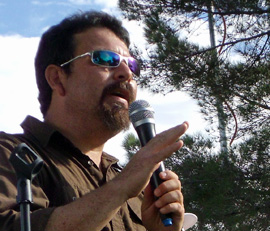Fernando Garcia

Border Network for Human Rights
It was at the moment that we started working with communities, organizing communities, understanding and listening to what the communities were about, that’s when things started changing. My conceptions and preconceptions were challenged, and many times destroyed, by the realization that border and immigrant communities’ demands and agendas were more complex than I thought that they would be. For them, this struggle was not only about comprehensive immigration reform. This becomes obvious but when you are working in a community where they don't have access to healthcare, or many kids cannot go to school because they don’t have the resources to send their kids to college, or when you have communities that don’t have running water, or that the living conditions or working conditions of communities are one of the most marginalized in the United States—that is the reality of the border area, and they just happen to be Hispanics and Mexicans who also need immigration reform. They realized, too, that the agenda is larger than just thinking about the legal presence of immigrants in the United States. That was our major realization: our communities are confronted not only with the lack of a status, but with racism, xenophobia, mistreatment, lack of government accountability, institutional violence—all of those elements. These human rights violations forced us, and forced me to think differently… We no longer believe that there’s such a thing as immigrant rights. What we believe now is that immigrant families in the United States want to be part of the society but they want to be part of a better society.


